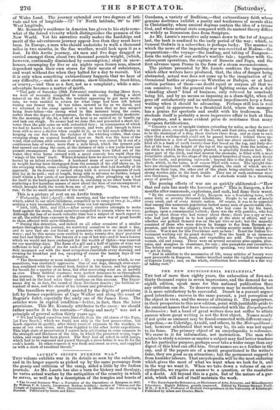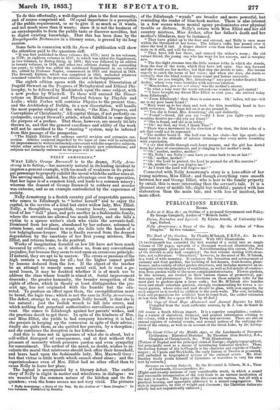THE NEW ENCYCLOP-EDIA. BRITANNICA. * THE test of more than eighty
years, the exhaustion of five-and- thirty thousand copies in seven impressions, and the demand for an eighth edition, speak more for this national publication than any criticism can do. To deserve success may be meritorious, but it is more satisfactory to be successful. Desert in a pursuit argues good intentions ; success in the same pursuit, a just perception of the object in view, and the means of attaining it. The proprietors, in their prospectus to this new edition, point with justifiable pride to the eminent names that have been connected with the Encyclopedia Britanniea ; but a band of great writers does not suffice to attain success where great writing is not the first object. Names nearly if not quite as eminent may be found connected with different ency- clopredias,—as Coleridge, Arnold, and others, in the 3fetropolitana ; but, however celebrated that work may be, its sale was not equal to its fame. The primary object of an encyclopedia is reference. We recur to it for information, not instruction. The man who wishes to study a science or master a subject may find better teachers for his particnlar purpose, perhaps must take a wider range than any digest of this kind can offer him. Great names are as a feather in the cap, and if the papers are of a merit proportioned to the writer's fame, they are good as an attraction ; but the permanent support is from humbler labours. That encyclopedia will be the most enduring which gives the most of what we want when we look for it, and in the way we want it. When we take down a volume of an en- cyclomdia, we require an answer to a question, or the resolution of a doubt. All beyond this is a gain, but of the nature of a gar- nish, which will not of itself maintain the work.
• The EncyclopsediaBritannica,orDictionary of Arts. Sciences, and Miscellaneous Literature. Eighth Edition, greatly improved. Edited by Thomas Stewart Tmill, M.D., F.R.S.E., Professor of Medical Jurisprudence in the University of Edinburgh. Published by Adam and Charles Black. To do this effectually, a well-digested plan is the first necessity, and of course competent aid. Of equal importance is a perception of the public requirement, so as to give it as much as it wants, and not much more than it wants ; since it is not the business of an encyclopiedia to form the public taste or discover novelties, but to digest existing knowledge. That this has been done by the Encyclopedia Britannica in a literary sense, is proved by its long MOMS.
Some facts in connexion with its form of publication will show the attention paid to the quantum suff. "It was first published in three volumes 4to, 1771; next in ten volumes, in 1778; in eighteen volumes in 1797; to which was added the Supplement, in two volumes, by Bishop Gleig, in 1801; this was followed by an edition in twenty volumes, in 1810, and other two editions during the succeeding ten years to which was added the celebrated Supplement in six voluides 4to, edited by Professor Napier, commenced in 1815 and finished in 1824. The Seventh Edition, which was completed in 1842, embodied whatever remained valuable in the previous editions and in the Supplements."
The eighth edition opens with the celebrated Dissertation of Dugrdd Stewart on the Progress of Metaphysical and Ethical Phi- losophy, to be followed by Mackintosh upon the same subject, with a new preface by Whewell. To these will succeed the Disser- tations on Mathematical and Physical Science by Playfair and Leslie; while Forbes will continue Physics to the present time, and the Archbishop of Dublin, in a new dissertation, will handle the most popular subject of the whole, "the Rise, Progress, and Corruptions of Christianity." All capital things, if not perfectly en- cyclopredic, except Stewart's article, which fulfilled in some degree the purpose of a preface. That these, however, are merely tit-bits thrown in, and that the general excellence and utility of the work will not be sacrificed to the " starring " system, may be inferred from this passage of the prospectus. "The Eighth Edition will undergo careful revision and extensive cor- rection. Articles rendered imperfect by the lapse of time will be submitted for improvement to writers intimately conversant with the respective subjects, whilst other articles will be superseded by entirely new contributions, and subjects not formerly embraced in its pages will be added."



























 Previous page
Previous page